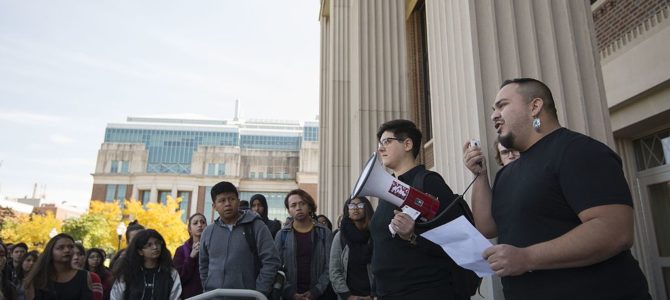
The U.S. Department of Justice joined a First Amendment lawsuit against the University of Michigan that claims UM’s speech codes covering harassment, bullying, and bias were unconstitutionally vague. In response, UM quickly stopped fighting the lawsuit and revised the language it uses to guide bias response team investigations.
The revisions may have temporarily ameliorated Michigan’s bad press, but it did not resolve the underlying problem: bias response teams, and the speech codes they enforce, use the power of the state to suppress unapproved speech and exert control over students. Such state action repressing free speech is corrosive to our democratic republic.
Michigan’s revised policy still allows them to punish unapproved speech. According to the university’s website, the revised definition of bullying is “Any written, verbal or physical act, or any electronic communication, directed toward a person that is intended to cause or that a reasonable person would know is likely to cause, and that actually causes, physical harm or substantial emotional distress and thereby adversely affects the ability of another person to participate in or benefit from the university’s educational programs or activities. Bullying does not include constitutionally protected activity or conduct that serves a legitimate purpose.”
This is a bureaucratic Gordian knot. So, speech is protected. Unless it isn’t.
Clearly, physical acts that physically harm another should be punished. Such occurrences are matters for Michigan’s campus police, not a bias response team. However, it appears raising one’s middle finger, a “physical act” directed toward another person, would also be a violation because a reasonable person knows it’s intended to be emotionally distressing.
I’ve not encountered any instances where flipping someone off, or being flipped off, is an act of kindness. Yet is it bullying? Maybe. The revised policy remains unclear.
Also consider an electronic communication scenario where a pro-life activist tweets that “abortion is murder” and another student who has had an abortion sees it and feels “substantial emotional distress.” The emotionally distressed student then files a complaint with administrators, leading to a bias response team investigation.
What is the standard for adjudication? One reading of UM’s policy is that the tweet was constitutionally protected and served a legitimate purpose. Nothing to see here. Another reading supports action against the speaker because a reasonable person knows the message was likely to cause emotional harm. It’s an impossible standard.
The pro-life speech is constitutionally protected, and there should be no adverse consequences for the speaker. That’s all fine in theory, but the existence of an investigation is an adverse consequence in itself. Reasonable people know investigations aren’t good. This is particularly troubling since UM’s administrators are state actors who serve as investigators, prosecutors, judges, and juries in their own inquiries.
In our scenario, a student spoke and the state investigated based on the content of the student’s speech. This possibility should be disquieting to anyone with even a modicum of interest in protecting civil liberties. In practice, speech codes and bias response teams are not about protecting students from harm, but about exerting the state’s power over its citizenry.
In testimony to Congress, former professor Brett Weinstein warned that the campus free speech crisis is a symptom of a more sinister problem: “What is occurring on college campuses is about power and control—speech is impeded as a last resort, used when people or groups fail to self-censor in response to a threat of crippling stigma and the destruction of their capacity to earn.”
Colleges and universities actively promote the notion that earning a degree leads to greater personal income. Administrative investigations threaten a student’s lifetime earnings, not just progress in their degree programs. The troika of speech codes, bias response teams, and administrative disciplinary hearings, which typically don’t have due process protections, are slowly dragging state universities away from freedom and toward oppression.
State legislators have noticed the progression and are taking action. Eight states have enacted laws protecting free speech on campus, and 16 other states have introduced similar legislation. State university governing boards are acting too.
The University of Wisconsin’s Board of Regents recently created a two-strikes policy punishing students who repeatedly impede others’ free speech by disrupting events. While their desire to promote free speech by stopping the heckler’s veto is admirable, the policy commits the same error speech codes do. Both limit free speech, limit freedom, and allow UW’s universities to oppress speech, but for a different reason. Speech codes and bias response teams chill free speech, but so does the two-strikes policy. It’s another example of the state exerting control over speech.
State colleges and universities can avoid First Amendment lawsuits, scrutiny from the Department of Justice, and legislative interference by jettisoning speech codes, ending bias response teams, and adopting the University of Chicago’s statement on freedom of expression. Michigan’s minor policy revisions got them out of the news cycle, but they didn’t solve the underlying problem. Speech codes are incompatible with the First Amendment. The sooner state colleges and universities end the practice, the better.









